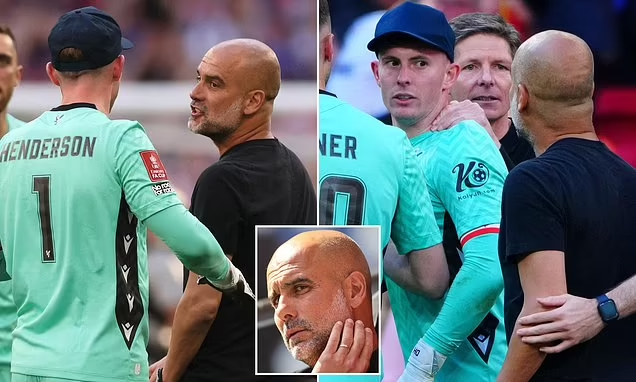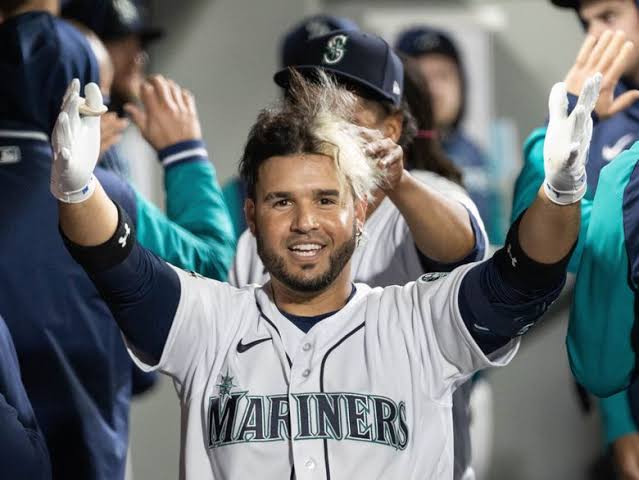In what will surely be remembered as one of the most shocking results of the season, Manchester City suffered a humiliating 5-1 defeat at the Emirates Stadium against title rivals Arsenal. For a team that has dominated English football for the better part of a decade under Pep Guardiola, the manner of this capitulation raises serious questions about the champions’ resilience and future prospects. This comprehensive analysis examines the match, its implications, and the uncharacteristically blunt post-match assessment from Guardiola himself, who did not shy away from criticizing his players’ lack of “duty” during the embarrassing evening in North London.
The Match Unfolding: From Contest to Collapse
The game began ominously for Manchester City, who found themselves trailing early when Arsenal capitalized on City’s notoriously vulnerable high defensive line. After weathering the initial storm, City showed their championship mettle by equalizing just before the hour mark, suggesting that normal service might resume as they have so often turned games around when falling behind.
However, what transpired in the final 30 minutes defied the script that City’s supporters have grown accustomed to. Rather than mounting their customary comeback, the champions disintegrated in spectacular fashion. Arsenal scored four unanswered goals in a devastating display of counterattacking efficiency, exploiting spaces left by City’s increasingly desperate attempts to regain control of the match.
“I only regret the last 20, 25 minutes,” Guardiola lamented post-match. “We forgot to do what we should do, what we’ve done for 60, 65, 70 minutes.” This forgetting – this tactical amnesia – is precisely what makes this defeat so remarkable. City’s identity under Guardiola has been built on unwavering tactical discipline, positional awareness, and emotional control. All three abandoned them at the Emirates.
The collapse was reminiscent of City’s 4-0 defeat to Tottenham earlier in the season, another London embarrassment that had previously represented Guardiola’s joint-heaviest defeat as City manager. Now joined by this Arsenal humbling, these twin capitulations in the capital provide compelling evidence that something fundamental has shifted in City’s previously impenetrable armor.
Guardiola’s Unvarnished Assessment
Perhaps the most telling aspect of this defeat was Guardiola’s post-match response. The Catalan is often protective of his players in public, preferring to shoulder blame or deflect criticism rather than exposing his squad to media scrutiny. Yet following the Emirates debacle, Guardiola’s words carried an unmistakable edge.
“They can be fragile but they have a duty to do,” he stated bluntly. “What they have to do and they did not do it.” The repeated emphasis on “duty” reveals Guardiola’s belief that this was not merely a tactical failure but a more fundamental dereliction of professional responsibility. In his philosophy, players are entrusted with specific roles within the collective structure; when those roles are abandoned, the entire system collapses.
Even more startling was Guardiola’s acknowledgment of the biological reality facing his aging squad: “It is obvious that the players are getting old, the manager is getting old, so it is normal.” This rare admission of mortality – both physical and sporting – stands in stark contrast to the aura of invincibility that City have cultivated during their period of dominance. It suggests Guardiola recognizes that a natural cycle may be reaching its conclusion.
When questioned about the dressing room atmosphere, Guardiola confirmed what many had suspected: “It has to be [angry and emotional] when you lose a football game in that way, especially in the last 25 minutes.” This emotional response further underscores the significance of the defeat. City’s dressing room has typically been characterized by measured analysis rather than emotional outbursts, another indication that this result struck at something deeper than most defeats.
The Wider Context: A Season of Inconsistency
This humbling comes at a particularly damaging juncture for Manchester City. With a crucial Champions League double-header against Real Madrid looming on the horizon, City’s confidence has been severely dented at precisely the moment they need to be peaking. European glory remains the holy grail for the club’s ownership, and advancement in the competition represents “the last chance for City to make a real success of their season,” as the situation was aptly described in the original report.
The Arsenal defeat is not an isolated incident but rather the most extreme manifestation of a concerning pattern that has emerged throughout the season. Guardiola himself acknowledged this recurring theme: “It’s a difficult game starting like that in this stadium, against that team in the first minutes and it’s happened many times this season.”
This inconsistency marks a significant departure from previous campaigns where City’s hallmark was their relentless reliability. The champions who completed an historic treble last season have been replaced by a more vulnerable iteration – capable of breathtaking football on their day but equally prone to alarming collapses when pushed out of their comfort zone.
Several factors may explain this newfound fragility:
1. Physical and Mental Fatigue
The toll of competing at the highest level across all competitions for multiple seasons cannot be underestimated. City’s core players have maintained an extraordinarily high standard for years, but human limits eventually assert themselves. The compressed schedule resulting from the COVID-19 pandemic, followed by a World Cup in the middle of a season, has intensified this burden.
Guardiola’s comment about players “getting old” points to this reality. Key figures like Kevin De Bruyne, İlkay Gündoğan, and Bernardo Silva have accumulated massive minute loads over recent seasons. Even the seemingly indefatigable Rodri has shown signs of wear. Mental fatigue compounds the physical; maintaining tactical concentration and emotional equilibrium becomes increasingly difficult as exhaustion sets in.
2. Tactical Evolution and Counter-Strategies
Guardiola’s system has evolved continuously during his tenure at City, but the fundamental principles have remained consistent. Opponents have had years to study, understand, and develop counter-strategies against these principles. Arsenal manager Mikel Arteta – formerly Guardiola’s assistant – exemplifies this trend, having used his intimate knowledge of City’s approach to construct effective opposition.
The high defensive line that has been crucial to City’s possession dominance has become increasingly vulnerable to teams willing to commit to rapid transitions. Without the recovery pace of previous seasons, City have been repeatedly exposed in transition moments this term.
3. Key Personnel Changes
The departure of İlkay Gündoğan to Barcelona represented a significant loss of leadership, tactical intelligence, and goal threat from midfield. Similarly, Riyad Mahrez’s exit removed a reliable source of creativity and clutch performances in big matches. While City recruited impressively with Jérémy Doku and Matheus Nunes, bedding in new players while maintaining performance levels presents inevitable challenges.
More fundamentally, this defeat highlighted how City have yet to adequately replace the commanding presence of Fernandinho, whose leadership and tactical fouling provided crucial structural stability in previous seasons.
The John Stones Factor
A telling sidebar to this defeat was the reaction of defender John Stones, who reportedly “SLAMMED” the City performance in the aftermath. As one of the senior figures in the dressing room, Stones’ outspoken criticism reflects the internal standards the players set for themselves. Having transformed from an error-prone talent into one of Europe’s most composed ball-playing defenders under Guardiola’s tutelage, Stones embodies the evolution City’s players have undergone.
His vocal disapproval suggests the players themselves recognize that performances like the one at the Emirates fall far below their own expectations, not merely those of their demanding manager. This internal accountability has been a hallmark of successful teams throughout history, but its public manifestation indicates the severity of the situation.
Guardiola’s Challenge: Regeneration Amid Competition
Despite the heavy defeat, Guardiola maintains a perspective that balances realism with optimism: “We are still in February, we have a lot of games to play. The senior players have been and are so important, and of course the new players will help us in the new times.”
This statement encapsulates the dual challenge Guardiola faces: extracting maximum performance from his established stars while simultaneously integrating new blood to ensure longevity. It’s a balancing act that defines all great dynasties in sport – knowing when to refresh the squad without discarding the winning culture embodied by experienced champions.
Arsenal’s resurgence under Arteta – ironically built on principles learned from Guardiola himself – has added another formidable competitor to a Premier League landscape that already includes Jürgen Klopp’s Liverpool and increasingly threatening Manchester United and Tottenham sides. The era of City’s comfortable dominance appears to be giving way to a more contested environment.
The Champions League Imperative
With domestic challenges mounting, the Champions League takes on even greater significance for City this season. The upcoming clash with Real Madrid represents more than just a quarterfinal tie; it’s an opportunity for redemption, to prove that the Arsenal defeat was an aberration rather than a terminal decline.
Real Madrid, with their unparalleled European pedigree, present the ultimate test of City’s resilience. How Guardiola’s men respond to this challenge will reveal much about their character and may well define their season. A strong performance could reignite their confidence and purpose; another collapse could accelerate the sense that a cycle is ending.
The Emotional Dimension
Perhaps the most concerning aspect of the Arsenal defeat was the emotional capitulation that accompanied the tactical breakdown. City teams under Guardiola have occasionally lost matches but rarely their composure. The final 25 minutes at the Emirates witnessed both.
This emotional fragility suggests deeper questions about the psychological state of the squad. Have years of success dulled their hunger? Has the pressure to maintain impossibly high standards become counterproductive? Is there an unconscious recognition that this particular group may have reached its natural conclusion?
These questions transcend tactics and touch on the human element that ultimately determines sporting success. Even the most sophisticated systems rely on human implementation; when belief wavers, execution inevitably suffers.
Learning from Defeat: The Guardiola Philosophy
Throughout his career, Guardiola has demonstrated a remarkable ability to learn from setbacks and evolve his approach. From Barcelona to Bayern Munich to Manchester City, each period of his managerial journey has been characterized by tactical innovation in response to challenges.
The Arsenal defeat, painful as it is, provides valuable information that could inform the next iteration of Guardiola’s City. The vulnerability in transition, the need for greater leadership when under pressure, the importance of emotional control – all these lessons can strengthen the team if properly integrated.
Guardiola’s contract situation adds another layer of intrigue to this process. With his current deal approaching its conclusion, will he commit to overseeing this regeneration project, or will he determine that a fresh voice is needed? His acknowledgment of his own aging alongside his players hints at an awareness of his own mortality in the role.
The Wider Significance
Beyond the immediate implications for Manchester City, this result resonates with the broader narratives of sporting competition. It serves as a reminder that dominance is always temporary, that cycles of success inevitably give way to periods of recalibration and renewal.
For Arsenal, the emphatic victory represents validation of their own development path under Arteta. Having absorbed the principles that made City great, they are now expressing them with their own distinctive identity. The student challenging the master is one of sport’s timeless storylines.
For neutral observers, the result injects fresh intrigue into competitions that had begun to feel predictable during City’s period of dominance. The vulnerability displayed by the champions suggests a more open, competitive landscape ahead – one where success must be earned anew rather than inherited from past achievements.
Conclusion: A Defining Moment
The 5-1 defeat at the Emirates Stadium will likely be remembered as a defining moment in the Guardiola era at Manchester City. Either it will mark the beginning of the end of a glorious period, or it will serve as the catalyst for renewal and reinvention.
Guardiola’s uncharacteristically direct criticism of his players indicates his recognition of the significance of this moment. By publicly identifying their failure to fulfill their “duty,” he has laid down a challenge – to themselves and to him – to rediscover the qualities that made them champions.
How City respond in the coming weeks, particularly against Real Madrid in the Champions League, will reveal much about their character and future prospects. Great teams are defined not just by their successes but by how they respond to adversity. The Emirates collapse has provided Manchester City with adversity in abundance; now they must demonstrate that their greatness extends to recovery as well as dominance.
As football history teaches us, no dynasty lasts forever. The question facing Manchester City is whether they are witnessing the natural conclusion of their extraordinary cycle of success or merely a difficult phase in an ongoing era of achievement. Guardiola’s comments suggest he is cognizant of both possibilities. His next moves, and those of his players, will determine which narrative ultimately prevails.



